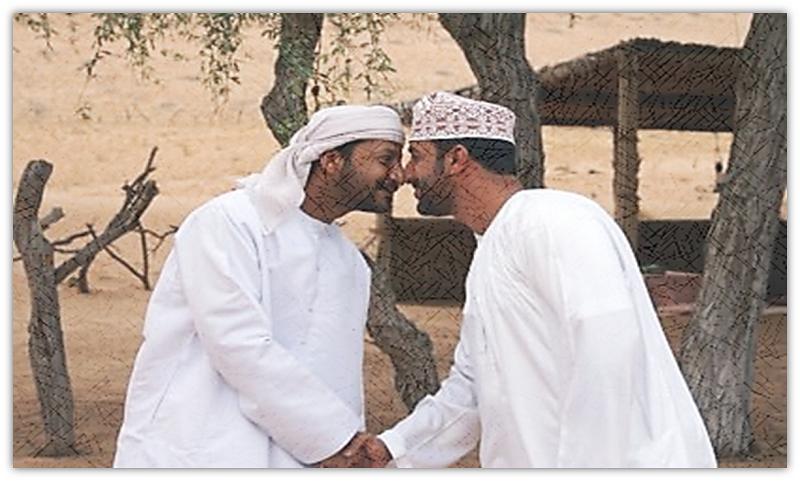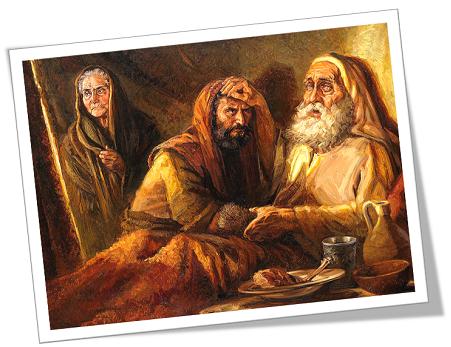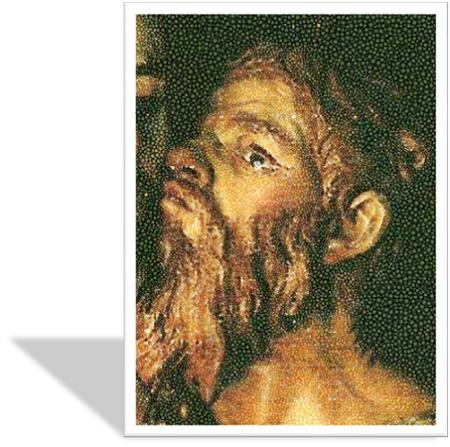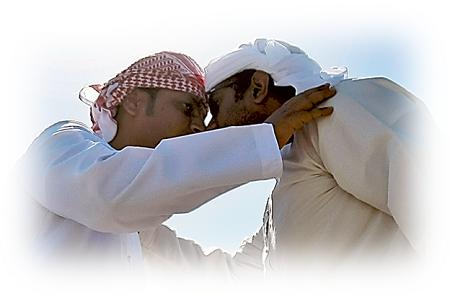Kisses and Covenant Blessings
Kisses and Covenant Blessings
So (Jacob) came near and kissed him.
Genesis 27:27a
And (Judas) kissed Him.
Matthew 26:49b
Greet one another with a holy kiss.
2 Corinthians 13:12

A Holy Kiss?⤒🔗
The apostle Paul concludes four of his letters (Romans, 1 and 2 Corinthians, and 1 Thessalonians) with the injunction to "greet one another with a holy kiss." As well, the apostle Peter commands the exiles of the Dispersion to "greet one another with the kiss of love."
What was this holy kiss with which the Christians were to greet one another? In the course of this article we will return to the holy kiss of the early Christian church. Let it suffice for now to say that this holy kiss was a sign of the fellowship which the church had.
The church is the covenant community of God formed by the agony of Good Friday. The Lord Jesus, who was betrayed with a kiss, obtained for His people the covenant blessings. He obtained the blessings which Jacob had seized when he betrayed his father Isaac with a kiss. And now, because the great Son of Israel has obtained rightfully what the father of Israel had seized through deception, the children of the new Israel can joyfully greet one another with a holy kiss.
The Kiss in Antiquity←⤒🔗
In the Ancient Near East, friends and relatives would often greet each other with a kiss. The sentiment which we today express by means of a firm handshake, the people of the Ancient Near East would convey with a kiss on the cheek. Even today, in many eastern cultures, a kiss of greeting is still the custom.
Since the Holy Spirit inspired the Scriptures in the context of the Ancient Near East, we should not be surprised to find evidence of this custom in the Bible. There are a number of references to parents and children kissing one another. Siblings greet each other in this way as do close friends and in-laws. As well, there are reports of men kissing their king as a sign of loyalty and homage. With very few exceptions (Song of Solomon 1:2; 7:9; 8:1, and Proverbs 7:13) the kiss in the Bible is devoid of any erotic or romantic content.
Several times kisses are used to deceive (2 Samuel 15:5ff, 20:3ff) The best known and, perhaps, the most glaring example of a deceiver's kiss is the kiss of Jacob with which he beguiled his father Isaac and obtained the covenant blessing.

The Kiss of Jacob←⤒🔗
The narrative of Jacob's deception is one of the very well-known accounts of the Old Testament. Jacob and his twin brother Esau were born to Isaac and Rebekah. Before they were born, they jostled each other within their mother. This was so bothersome for Rebekah that she went to inquire of the LORD about it. When she did, the LORD God told her that there were two nations in the womb, that there would be a division between these two peoples, and that the older child would serve the younger.
Right now we are concerned about the last point. The LORD God decreed that the law of the firstborn would, in this case, be reversed. According to the law of primogeniture (cf. Deuteronomy 21:15-17), the firstborn son was to receive a double share of his father's estate upon the death of his father. The law also said that the younger son was to be subservient to the older. However, in the case of Jacob and Esau, the LORD God, in His sovereign electing choice, declared that Jacob was to be considered as if he were the older son. Just as God chose Isaac instead of Ishmael, so He chose Jacob above Esau. Just as Abraham was to convey the blessing he received from the LORD to Isaac, so Isaac was to transmit the blessing of Abraham to Jacob.
Isaac was the steward of the blessing of Abraham (Genesis 28:4). It was his task to pass it on to the child of God's choice. However, Isaac, afflicted with the poison of parental favouritism (Genesis 25:28), wanted to thwart the plan of God and pass the blessing on to Esau, the son whom he loved.
Isaac, old and going blind, believing that he would soon die, summoned Esau to his tent. He told his son to go to the open country, to shoot some wild game, and prepare a delicious meal for him. After that he would bless Esau.
Rebekah, who favoured Jacob as much as Isaac favoured Esau, overheard the conversation. She wanted Jacob to receive the blessing. And so she convinced the scared Jacob to dress himself in some of Esau's hunting clothes. Rebekah prepared some savory lamb for Isaac. She used the skins to cover the smooth skin of Jacob's neck and hands so that it would feel rough like Esau's.
Disguised as Esau, Jacob brought the meal to his father. And the charade begins. Isaac expresses surprise that "Esau" should be back already. Jacob replies, "The LORD your God granted me success." Blind Isaac, not convinced that the man in his tent is his oldest son, asks him to come near. When he feels his hands he surmises that it must be Esau.
And so Isaac requests "Esau" to serve him the meal of game. After eating, he will give the blessing. After he has finished the meal, Isaac is still suspicious. So he says, "Come near and kiss me, my son." As Jacob kisses his father, Isaac catches the smell of Esau's clothes. He smells the country and the open fields. This finally convinces him that the man who kissed him was his favourite son Esau. And so he blesses him.
Isaac promises him that all the treasures of the land will be his. Nations will serve him. His brothers will bow before him. God will curse those who curse him and bless those who bless him. In other words, Isaac blessed Jacob with the blessing of Abraham although thinking he has passed it on to Esau.
Jacob, true to the meaning of his name, deceived his father with a kiss. Through betrayal and intrigue sealed with a kiss, he seizes the covenant blessing for himself and his descendants.
There is no doubt whatsoever that the conspiracy of Rebekah and Jacob was subservient to the sovereignty of God. God has chosen Jacob. It was according to God's fore-ordination that Jacob should receive the blessing of Abraham.
And yet there is no getting around the fact that Jacob seized those blessings illegitimately. We see here another example of God using the sinful actions of men and women to bring about His eternal plan. Although God meant it for good, the fact is that Jacob, the father of Israel, wrested the blessings of the covenant out of the hands of God.
Who would make things well? Who would remedy the situation so that the children of Israel would have the blessings of the covenant legitimately?
The Lord Jesus, the great Son of Israel!

The Kiss of Judas←⤒🔗
If the kiss of Jacob is the most notorious kiss of the Old Testament, the kiss of Judas undoubtedly ranks as the most reprehensible recorded in the whole Bible.
Judas, one of the twelve, agreed to betray his Master to the chief priests for the standard price of a slave – thirty pieces of silver (cf. Exodus 21:32).
Afraid that they might not recognize the One whom they hate in the darkness of the garden, and that He might escape in the commotion of the attempted arrest, Judas and the priests agree upon a sign. Judas would kiss Him. It was not unusual for a student to greet his rabbi with a kiss, it was a sign of love and reverence. How despicable that Judas should use this sign of love in order to betray his Master!
The Lord Jesus, having prayed to His Father in the garden and come to the full realization that the cup of suffering could not pass unless He drank of it, told His disciples that His betrayer was at hand. There came Judas, one of the twelve, with an enormous crowd armed with swords and clubs to capture the Lamb of God. Judas, without a moment's hesitation, walked up to the Lord Jesus. He greeted his Rabbi with, "Hail, Master!" And he kissed Him.
Those armed with the swords and clubs then moved forward and arrested their enemy. Jesus, identified and betrayed by Judas' kiss, is led away like a lamb to the slaughter. The One who was betrayed by a kiss is tried, abused, mocked, tortured, and, finally, left to die hanging in the air on a Roman cross, rejected by earth and forsaken by heaven.
How contemptible that it was a kiss which sent Jesus to the cross. How painful to be subjected to such deceit, such trickery.
However, we, to whom the secret counsel and will of God concerning our redemption has been fully revealed, know that the Lord Jesus Christ was not kissed by Judas in vain. And we know that the Lord Jesus was not the victim of a tragic set of circumstances. Nor was He nothing more than simply the prey of some jealous priests and the scapegoat of a disenchanted disciple. He was the Lamb of God. He was the One who came in order to redeem for His Father a people. He was kissed by Judas so that He might restore to us the covenant blessings of God.
This does not absolve Judas. "The Son of man – goes as it is written of Him, but woe to that man by whom the Son of man is betrayed" (Matthew 26:24). Judas bears the responsibility for his evil intentions and the consequences of his kiss. But the gospel is that God, in His sovereignty, took up also this terrible action of a man in order to bring about His plan to restore to His people the blessing of Abraham.
Jacob, the Father of Israel, seized the covenant blessing when he deceived Isaac with a kiss, Jesus, the great Son of Israel, betrayed by a deceiver's kiss, rightfully obtained the covenant blessings. And He now shares them with the Israel of God – with all those who are grafted into Him by faith.
One could even say that Jesus was punished for the deceiving kiss of Jacob through the betrayal kiss of Judas. Jesus was punished for the fact that Israel had stolen the blessing by means of a kiss. The Israel of God, consolidated in its Suffering Servant, was punished for its deception and trickery. And now, in Christ Jesus, the blessing of Abraham has come upon the Israel of God – also upon the Gentiles who receive the promise of the Spirit through faith (Galatians 3:14). "For if you are Christ's then you are Abraham's offspring, heirs according to the promise." (Galatians 3:29)
And so we, in Christ, as fellow heirs of the promise, may greet one another with a holy kiss.
The Holy Kiss←⤒🔗
We may greet one another with a holy kiss because we share in the covenant blessings. The apostle concludes his second letter to the church at Corinth with an admonition to agree with one another and to live in peace. And then he says, "Greet one another with a holy kiss." They are to show their solidarity in Christ in this way. The holy kiss symbolizes the love of Christ mutually shared.

As indicated earlier, the kiss was a common form of greeting much like our handshake. When people met, they would give each other a kiss on the cheek. Paul says that the kiss is to be a holy kiss because for the church it is a sign of fellowship in Christ. They are the communion of saints–the communion of those made holy by the blood of Christ.
By the time of Justin Martyr (c. 110-165), the "kiss" had become part of the liturgy. Justin writes in his First Apology, ch. 65, "Having ended the prayers, we salute one another with a kiss."1 Immediately after the kiss, writes Justin, they would celebrate the Lord's Supper. Before they partook of the covenant meal, they would show their unity in Christ by means of a kiss.
Bard Thompson says that "…it sealed peace and reconciliation among men … (it signified) one of the central meanings of the sacrament, namely, the love and unity among those who are members of the Body of Christ."2
From Acts 2:42 we know that the early Christian church devoted itself "… to the apostles' teaching and fellowship, to the breaking of bread and the prayers." Could the "fellowship" mentioned here have included greeting one another with a holy kiss before they broke the bread of the Lord's Supper? Could it be that after the church had read Paul's letter (the Word of God), and after having greeted one another with a holy kiss as he commanded them to do, that they then partook of the Lord's Supper? It seems likely considering that this was customary by the time of Justin.
How fitting that the meal by which the church commemorates the Good Friday sacrifice of its Lord should be preceded by a kiss signifying the solidarity which believers have through the reconciling work of their Lord. How proper that believers should greet each other in such a way before sharing in the supper at which they remember the passion of Him who was betrayed by a kiss. How apt it is that the children of the Israel of God should show in a tangible way the unity they have in Him who obtained for them the blessings which were once stolen with a kiss.
We should not think that we are disobeying the Word if we do not greet each other with a kiss. Methods of greeting vary from age to age and culture to culture. It is not customary for us to kiss one another when we meet. Furthermore, one wonders whether we should disturb the dignity of the Reformed worship service with some variant of the holy kiss (a holy handshake?) before we proceed to the Lord's table, although there would be something beautifully symbolic about such mutual greetings.
How we greet one another is not the point. And whether or not such a greeting is part of the liturgy is not the important thing. What is important is that we greet one another as fellow partakers in the salvation of Jesus Christ. We have been saved by the One who was betrayed by a kiss on Good Friday. All the promises of the covenant God established with Abraham are ours in Christ.
Let us this Easter, united in Him who was betrayed by a kiss, greet one another joyfully knowing that we are fellow heirs of the blessings of God's covenant. We have been redeemed from all deceit, trickery, self-seeking, and guile. Let us now go forward united in Christ, in fellowship, in the labour of the gospel, to the glory of God.
Bibliography
- Bromiley, G.W., ed. The International Standard Bible Encyclopedia, rev. ed., 4 vols. Grand Rapids: Eerdmans, 1979-1988.
- Kittel G., and G. Friedrich, ed. Theological Dictionary of the New Testament, 10 vols., Trans. G.W. Bromiley. Grand Rapids: Eerdmans, 1964-76.
- Roberts, A. and J. Donaldson, ed. The Ante-Nicene Fathers, vol.1Reprint, GrandRapids: Eerdmans, 1953.
- Thompson Bard. Liturgies of the Western Church. New York: New American Library, 1961.

Add new comment